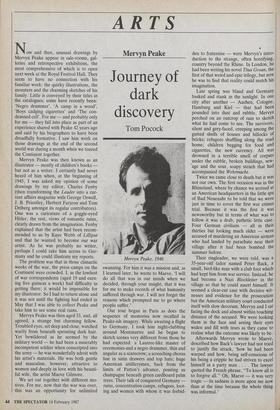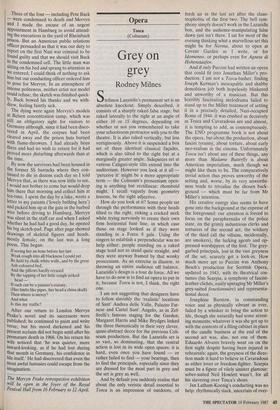ARTS
Mervyn Peake
Journey of dark discovery
Tom Pocock
Now and then, unusual drawings by Mervyn Peake appear in sale-rooms, gal- leries and retrospective exhibitions, the most comprehensive of which is to open next week at the Royal Festival Hall. They seem to have no connection with his familiar work: the quirky illustrations, the monsters and the charming sketches of his family. Little is conveyed by their titles in the catalogues; some have recently been: `Negro drummer', 'A camp in a wood', `Boys cadging cigarettes' and 'The con- demned cell'. For me — and probably only for me — they fall into place as part of an experience shared with Peake 42 years ago and said by his biographers to have been dreadfully formative. I saw him work on those drawings at the end of the second world war during a month when we toured the Continent together.
Mervyn Peake was then known as an illustrator — mostly of children's books but not as a writer. I certainly had never heard of him when, at the beginning of 1945, I was asked my opinion of some drawings by my editor, Charles Fenby (then transforming the Leader into a cur- rent affairs magazine with George Orwell, J. B. Priestley, Herbert Farj eon and Tom Driberg amongst its regular contributors). One was a caricature of a goggle-eyed Hitler; the rest, views of romantic ruins, clearly drawn from the imagination. Fenby explained that the artist had been recom- mended to us by Kaye Webb of Lilliput and that he wanted to become our war artist. As he was probably no writer, perhaps I could take him across to Ger- many and he could illustrate my reports.
The problem was that in those climactic weeks of the war, the press camps on the Continent were crowded. I, as the lowliest of war correspondents (aged 19 and earn- ing five guineas a week) had difficulty in getting there; it would be impossible for my illustrator. So I had to return alone and it was not until the fighting had ended in May that I was able to collect Peake and take him to see some real ruins.
Mervyn Peake was then aged 33, and, all agreed, a strange but charming fellow. Troubled eyes, set deep and close, watched warily from beneath sprouting dark hair. Yet bewildered as he seemed by the military world — he had been a miserably incompetent soldier when conscripted into the army — he was wonderfully adroit with his artist's materials. He was both gentle and masculine, however; attractive to women and deeply in love with his beauti- ful wife, the artist Maeve Gilmore.
We set out together with different mo- tives. For me, now that the war was over, this was an opportunity for unlimited swanning. For him it was a mission and, as I learned later, he wrote to Maeve, 'I will do all that was in our minds when we decided, through your insight, that it was for me to make records of what humanity suffered through war. I will not forget the reasons which prompted me to go where people suffer.'
Our tour began in Paris as does the sequence of memories now recalled in Peake-ish imagery. While awaiting a flight to Germany, I took him night-clubbing around Montmartre and he began to sketch scenes very different from those he had expected: a Lautrec-like master of ceremonies and a negro drummer, thin and angular as a scarecrow; a screeching chorus line in satin drawers and top hats; huge American artillerymen, back from the limits of Patton's advance, pouring us champagne beneath green cardboard palm trees. Their talk of conquered Germany ruins, concentration camps, refugees, loot- ing and women with whom it was forbid- Mervyn Peake, 1946 den to fraternise — were Mervyn's intro- duction to the strange, often horrifying, country beyond the Rhine. In London, he had been writing his novel Titus Groan, the first of that weird and epic trilogy, but now he was to find that reality could match his imagination.
Late spring was bland and Germany basked and stank in the sunlight. In one city after another — Aachen, Cologne, Hamburg and Kiel — that had be,en pounded into dust and rubble, Mervyn perched on an outcrop of ruin to sketch what he had come to see. The survivors, silent and grey-faced, creeping among the gutted shells of houses and hillocks of bricks; refugees shuffling along the road home; children begging for food and cigarettes, the new currency. All was drowned in a terrible smell of corpses under the rubble, broken buildings, sew- 'age and the sour, soapy stench that had accompanied the Wehrmacht. Twice we came close to death but it was not our own. The first occasion was in the Rhineland, where by chance we arrived at an American headquarters in the little spa of Bad Neuenahr to be told that we were just in time to cover the first war crimes trial. Because it was the first it was newsworthy but in terms of what was to follow it was a drab, pathetic little case. Four German civilians — all in their thirties but looking much older — were accused of murdering an American airman who had landed by parachute near their village after it had been bombed the summer before.
Their ringleader, we were told, was a 35-year-old tailor named Peter Back, a small, bird-like man with a club foot which had kept him from war service. Instead, he had become a Nazi Blockleiter in the village so that he could assert himself. It seemed a clear-cut case with decisive wit- nesses and evidence for the prosecution but the American military court conducted itself with slow decorum. Mervyn and I sat facing the dock and almost within touching distance of the accused. We were looking them in the face and seeing their eyes widen and fill with tears as they came to realise what the outcome was likely to be.
Afterwards Mervyn wrote to Maeve, described how Back's lawyer had not tried to justify the attack, 'how he had been warped and how, being self-conscious of his being a cripple he had striven to excel himself as a party man . . . . The lawyer quoted the French phrase, "To know all is to forgive all." Oh, Maeve — it was very tragic — its sadness is more upon me now than at the time because the whole thing was informal.' Three of the four — including Pete Back were condemned to death and Mervyn and I made the excuse of an urgent appointment in Hamburg to avoid attend- ing the executions in the yard of Rheinbach prison. But an American public relations Officer persuaded us that it was our duty to report on the first Nazi war criminal to be found guilty and that we should visit Back in the condemned cell. The little man was sitting on his bed and sprang to attention as we entered; I could think of nothing to ask him but our conducting officer ordered him to pose for Mervyn. In an atmosphere of intense politeness, neither artist nor model could refuse; the sketch was finished quick- 1Y, Back bowed his thanks and we with- drew, feeling faintly sick. The dying were again Mervyn's models at Belsen concentration camp, which was still an obligatory sight for visitors to Germany although, since it had been disco- vered in April, the corpses had been cleared away and the prison huts burned with flame-throwers. I had already been there and had no wish to return for it had proved more disturbing afterwards than at the time.
By now the survivors had been housed in the former SS barracks where they con- tinued to die in dozens each day so I told Mervyn that, as there was now little to see, I would not bother to come but would drop him there that morning and collect him at tea-time. I spent the day by a lake, wrote a letter to my parents (`lovely bathing here') and picked him up at the gate in the barbed wire before driving to Hamburg. Mervyn Was silent in the staff car and when I asked whether he had had a good day, he opened his big sketch-pad. Page after page showed drawings of skeletal figures and heads, mostly female; on the last was a long poem. This began:
If seeing her an hour before her last Weak cough into all blackness I could yet Be held by chalk-white walls, and by the great Ash-coloured bed, And the pillows hardly creased By the tapping of her little cough-jerked head — If such can be a painter's ecstasy, (Her limbs like pipes, her head a china skull) Then where is mercy?
And what Is this my traffic?
After our return to London Melvyn Peake's novel and its successors were Published; he continued to paint and write verse; but his mood darkened and his Present acclaim did not begin until after his premature death in 1968. On his return his wife noticed that 'he was quieter, more inward-looking, as if he had lost during that month in Germany, his confidence in life itself.' He had discovered that even the most awful fantasies could escape from the imagination.
The Mervyn Peake retrospective exhibition will be open in the foyer of the Royal Festival Hall from 16 February to 12 April.



























































 Previous page
Previous page